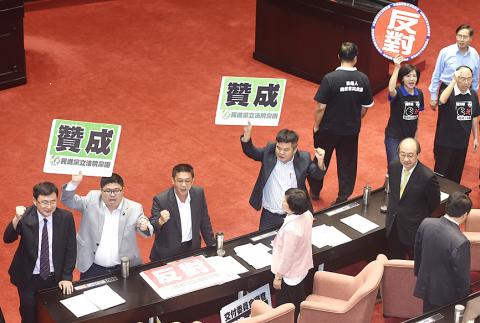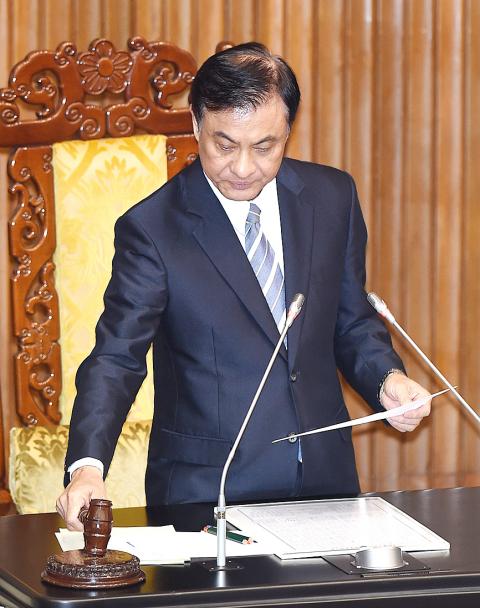The Special Investigation Division (SID) is to be formally abolished and its responsibilities transferred back to prosecutors, the Legislative Yuan said yesterday.
The SID’s dissolution will take effect on Jan. 1, Democratic Progressive Party (DPP) Legislator Yu Mei-nu (尤美女) said.
The SID was created amid expectations that the government would be able to rein in corrupt civil servants, but in 2013, then-prosecutor-general Huang Shih-ming (黃世銘) illegally wiretapped a lawmaker, Yu said, adding that the SID has since become a judiciary organ not to combat crime, but to persecute people.

Photo: Liao Chen-huei, Taipei Times
The legislature has abolished the SID because it had become uncontrollable, Yu said.
Chinese Nationalist Party (KMT) Legislator Lin Te-fu (林德福) said that the dissolution of a judiciary organ tasked with investigating corruption by high-ranking officials seems to send the message that the DPP is willing to tolerate such acts.
The SID should continue to exist, as normal prosecutors might not have the initiative to prosecute cases against high-ranking government officials, the KMT legislative caucus said, adding that the division would also have more time, as investigating such cases was its sole duty.

Photo: Liao Chen-huei, Taipei Times
Lin also questioned amendments to Article 63 of the Organic Act for Courts (法院組織法), which formed the legal basis for the SID, and said that the amendments could not prevent politics interfering in the judiciary.
As the amended article exempts prosecutors from the constraints of Article 62, which states that prosecutors are to perform duties in their jurisdictions, if they are appointed to head investigations by the prosecutor-general, the Taiwan High Court or the attorney general of the Taiwan High Prosecutors’ Office, the prosecutor-general’s power as the top-ranking entity among the three leaves a loophole for political intervention, Lin said.
In other news, the Legislative Yuan passed an amendment to Article 27 of the Civil Servants Election and Recall Act (公職人員選舉罷免法) barring elected officials who step down or candidates whose nominations are invalidated by a court due to bribery from running in by-elections.
Additional reporting by CNA

Intelligence agents have recorded 510,000 instances of “controversial information” being spread online by the Chinese Communist Party (CCP) so far this year, the National Security Bureau (NSB) said in a report yesterday, as it warned of artificial intelligence (AI) being employed to generate destabilizing misinformation. The bureau submitted a written report to the Legislative Yuan in preparation for National Security Bureau Director-General Tsai Ming-yen’s (蔡明彥) appearance before the Foreign Affairs and National Defense Committee today. The CCP has been using cognitive warfare to divide Taiwanese society by commenting on controversial issues such as Taiwan Semiconductor Manufacturing Co’s (TSMC, 台積電) investments in the

INVESTIGATION: The case is the latest instance of a DPP figure being implicated in an espionage network accused of allegedly leaking information to Chinese intelligence Democratic Progressive Party (DPP) member Ho Jen-chieh (何仁傑) was detained and held incommunicado yesterday on suspicion of spying for China during his tenure as assistant to then-minister of foreign affairs Joseph Wu (吳釗燮). The Taipei District Prosecutors’ Office said Ho was implicated during its investigation into alleged spying activities by former Presidential Office consultant Wu Shang-yu (吳尚雨). Prosecutors said there is reason to believe Ho breached the National Security Act (國家安全法) by leaking classified Ministry of Foreign Affairs information to Chinese intelligence. Following interrogation, prosecutors petitioned the Taipei District Court to detain Ho, citing concerns over potential collusion or tampering of evidence. The

‘COMPREHENSIVE PLAN’: Lin Chia-lung said that the government was ready to talk about a variety of issues, including investment in and purchases from the US The National Stabilization Fund (NSF) yesterday announced that it would step in to staunch stock market losses for the ninth time in the nation’s history. An NSF board meeting, originally scheduled for Monday next week, was moved to yesterday after stocks plummeted in the wake of US President Donald Trump’s announcement of 32 percent tariffs on Taiwan on Wednesday last week. Board members voted to support the stock market with the NT$500 billion (US$15.15 billion) fund, with injections of funds to begin as soon as today. The NSF in 2000 injected NT$120 billion to stabilize stocks, the most ever. The lowest amount it

NEGOTIATIONS: Taiwan has good relations with Washington and the outlook for the negotiations looks promising, Minister of Economic Affairs J.W. Kuo said Taiwan’s GDP growth this year is expected to decrease by 0.43 to 1.61 percentage points due to the effects of US tariffs, National Development Council (NDC) Minister Paul Liu (劉鏡清) said at a meeting of the legislature’s Economics Committee in Taipei yesterday, citing a preliminary estimate by a private research institution. Taiwan’s economy would be significantly affected by the 32 percent “reciprocal” tariffs slapped by the US, which took effect yesterday, Liu said, adding that GDP growth could fall below 3 percent and potentially even dip below 2 percent to 1.53 percent this year. The council has commissioned another institution